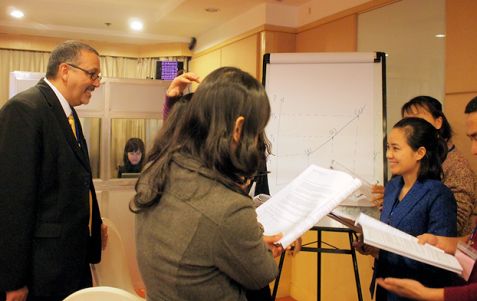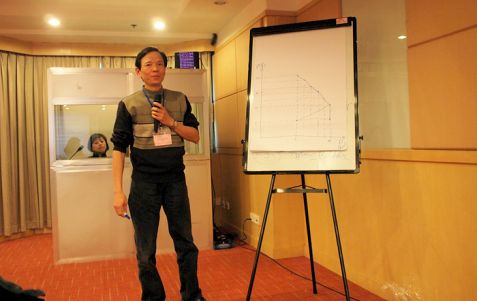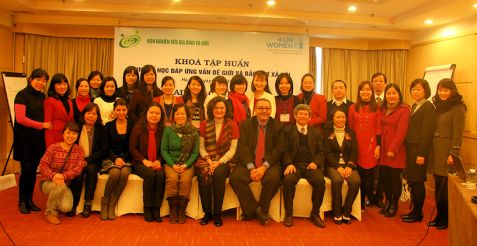Supportive Social Protection System to Enhance Women’s Economic Livelihoods and Participation in the Labor Force
Date:
Social protection plays a fundamental role in creating inclusive and sustainable development. It helps in tackling multiple dimensions of poverty and deprivation through the provision of decent work, education, health care, food and income security and can therefore be a powerful tool in the battle against poverty and inequality. Women are the poorest of the poor and the ones to suffer the most due to lack of social security nets and access thereof. In the absence of adequate social protection they are subjected to increased risks of sinking below the poverty line or remaining trapped in poverty for generations.

The first training on ‘Gender Responsive Economics and Social Protection’ in Viet Nam. Photo credit: Institute of Family and Gender Studies
The UN Women Programme on Economic Livelihoods and Social Protection in Vietnam supported by the Department of Foreign Affairs and Trade (DFAT), Australia is committed to enhancing women’s economic participation by fostering a conducive and strong social protection system in Vietnam. One of the programme objectives is to work with the research community in Vietnam to encourage and produce robust academic and evidence based research in the area of ‘Gender responsive social protection’ for Vietnam. In order to take this forward, UN Women has invested in the institutional capacity building process of the Institute of Family and Gender Studies (IFGS), a leading research institute based in Hanoi.
A training programme on ‘Gender Responsive Economics and Social Protection’ was exclusively designed for the researchers of the Institute IFGS which was conducted from 10th-16th February 2014 in Hanoi. The purpose of the training was to increase the technical knowledge of the participants on concepts and theories in the area of gender-responsive economics, provide skills in using tools and frameworks of gender-responsive economic analysis and demonstrate linkages between gender-responsive economics and social protection programs. The six days training was conducted by Professor Agaha Haroon Akram-Lodhi, Chair, Department of International Development Studies, Trent University, Canada.

Participants presented their ideas on developing gender-responsive social protection policy briefs. Photo credit: Institute of Family and Gender Studies
“I expect to have more training courses like this one. I'd like to thank organizers, sponsors and enthusiastic participants.”
— Participant feedback received in the Training Evaluation
The training drew on the content and modules of the Gender Economic Policy Management Initiative (GEMPI) of the UNDP programme which has been developed to respond to the urgent need of incorporating gender perspectives into national development frameworks. In addition, it was supplemented with content and information on Social Protection. This is the first time a tailor made training on Gender, Economics and Social Protection has been offered in Vietnam. The training material was also translated into Vietnamese with the training being conducted with simultaneous translation from English. There were 23 participants who were awarded certificates of participation at the end. The content and pedagogy of the training programme was received with much applause and positive feedback from the participants.
An important outcome of the training was that on the final day, the participants were able to prepare and present their ideas on developing gender-responsive social protection policy briefs based upon 8 topics covered during the training workshop. Hence, some of the potentially-interesting research areas that could be undertaken such as piloting cash transfers to females; linking microfinance to social insurance schemes; reforming educational curricula to reflect gender equality; improving data collection mechanisms etc emerged from the group. The participants thereby demonstrated strong abilities in distinguishing between labour market programs, social insurance programs, and social assistance programs, as the principal domains of gender-responsive social protection. UN Women shall partner with IFGS in the second year of its programme to take forward some of these research pieces to further strengthen and contribute to the social protection system in Vietnam.

UN Women recognizes the need for conducting similar trainings in Vietnam.
Photo credit: Thao Hoang/UN Women in Viet Nam
Post the success of this programme, UN Women recognizes the appetite, need and value for conducting and hosting similar trainings in Vietnam with other research agencies, key government ministries and line departments. The subject area of Gender and Economics coupled with Social Protection is urgent and timely as the Government of Vietnam is currently in the process of improving and strengthening its Social Assistance and Social Protection system through the investment support of international donors.
For further information on the training programme please get in touch with Ruchika Bahl at Ruchika.bahl@unwomen.org.